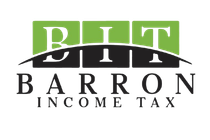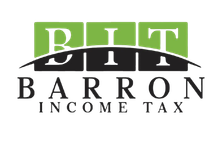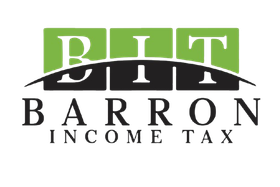Expert Guidance for effortless solutions
TAX PREP SERVICES IN NORTH COUNTY SAN DIEGO
Expert Tax Preparation
We simplify and streamline the entire tax process, resulting in accurate filings and maximized tax refunds.
Personalized Tax Planning
We offer tailored strategies to reduce your tax burden and help you meet your financial goals.
Bookkeeping Made Simple
We provide effortless management of your business's finances with monthly reports and tax-ready records.
Affordable Payroll Services
We've streamlined payroll processing, saving valuable time while ensuring compliance every pay cycle.
Transform TAX PREP EXPERIENCES: PARTNER with THE BARRON TEAM
At Barron Income Tax, we believe in more than just number crunching; we craft personalized tax strategies that align with your financial goals. Serving North County San Diego's diverse clientele, we are committed to helping you make the most out of your finances, whether it's through retirement planning or small business tax preparation. Our dedicated team of specialists is ready to demystify the tax maze, ensuring clarity and confidence every step of the way. Contact us today to discover how we can assist you in securing a brighter financial future.

EXPLORE Comprehensive Tax PREP Solutions
Let us simplify your financial journey—ensuring compliance, maximizing returns, and securing your financial future.
SERVING VALUED CLIENTS IN NORTH COUNTY SAN DIEGO SINCE 2015
At Barron Income Tax, we are a family-owned business founded in 2015, proudly serving the diverse community of North County San Diego. Our mission is to empower clients by providing expert tax preparation, payroll, and immigration services tailored to their unique needs. With a commitment to integrity, personalized care, and clear communication, we guide each client through financial decisions with confidence. Whether you're managing personal finances or running a small business, our dedicated team ensures your goals are met, building long-lasting relationships along the way. We're not just your tax professionals; we're your trusted advisors for financial success.
TAKING A STRATEGIC APPROACH TO TAX PREPARATION SERVICES
Tax preparation doesn’t need to be a daunting maze. Our team simplifies the process, ensuring every deduction and credit is utilized strategically and effectively. We remain up-to-date with the latest tax laws, ensuring you never miss a step. From filing simple individual taxes to deducing complex business tax situations, we’re here to maximize your returns and provide a stress-free tax prep experience.
Introducing Our Second Location in San Marcos, CA
We are thrilled to announce our new office in San Marcos to better serve our community.
Address:
500 S Rancho Santa Fe Rd, Suite 104 San Marcos, CA
Services Offered:
- Tax Preparation
- Payroll Services
- Immigration Assistance
Contact Us:
- Phone: 760-295-3590
- Email: jr@barronincometax.com
Visit our San Marcos location for the trusted services you expect from Barron Income Tax!
RELIABLE PAYROLL SERVICES FOR OPTIMIZED BUSINESS OPERATIONS
Streamline your payroll processes with our bespoke services, tailored to meet your business's unique needs. Keep your workforce happy with accurate and timely paychecks, freeing you to focus on growth. Whether it's quarterly filings or handling intricate deductions, our experts ensure seamless operations. With tax payroll preparation as our forte, we make navigating regulations stress-free. Let us handle your payroll, so you can handle your business.

READ REAL STORIES OF CLIENT SUCCESS
NavigatING YOU TO Success with Expert Immigration Services
Our immigration services are crafted to simplify complex processes and ensure compliance with current regulations. Whether it’s obtaining work visas, citizenship applications, or adjusting legal status, our informed experts are ready to assist. We understand the nuances of immigration law and provide personalized guidance every step of the way. Secure your peace of mind and solidify your immigration future with our help. Take the first step towards your dreams today.
Trusted PartnerS for a clear financial path
We pride ourselves on delivering exceptional services designed to meet and exceed client expectations. Here’s why we stand out:
- Customized tax strategies that maximize returns
- Experienced professionals with extensive industry knowledge
- Timely and accurate payroll services
- Comprehensive support for immigration services
- Commitment to client education and empowerment
From retirement planning to annual filings, our service is comprehensive and client-focused. Utilize professional help to ensure compliance and maximize your returns. Let us show you the path to fiscal serenity!
CONTACT BARRON INCOME TAX
Fill out the form below, and a member of our staff will reach out to you soon!
Contact Us
FREQUENTLY ASKED QUESTIONS
Why is Barron Income Tax so popular?
At Barron Income Tax, we pride ourselves on offering comprehensive Tax Prep services to clients throughout North County San Diego. Our Tax Prep team is dedicated to ensuring that each client receives personalized attention, whether you're filing individual or business taxes. We understand that accurate Tax Prep is essential to avoid costly mistakes, and our experts are here to guide you through every step of the process. With years of experience in the field, we offer reliable Tax Prep that ensures your returns are filed on time and in full compliance with tax laws. Trust Barron Income Tax for all your Tax Prep needs, and let us help you achieve peace of mind this tax season. Call us today to get started with expert Tax Prep services!
What services does Barron Income Tax offer?
At Barron Income Tax, we specialize in a range of services designed to meet both individual and business tax needs. Our offerings include personal tax preparation, small business and corporate tax services, payroll services, and even immigration services. Our team of experienced professionals is equipped to handle complex tax scenarios, ensuring compliance and optimizing outcomes for our clients. With our comprehensive services, we aim to provide solutions that address all aspects of your financial requirements. Interested in learning more about how we can assist you? Reach out for a consultation today!
How can Barron Income Tax help with retirement planning?
Retirement planning is a critical aspect of achieving long-term financial security, and Barron Income Tax is here to guide you through it. We understand the unique tax challenges retirees face, and our team is adept at crafting personalized tax strategies that maximize your retirement income. From tax-efficient withdrawal strategies to utilizing tax-advantaged investments, our approach is tailored to reduce your tax burden and enhance your financial stability. Ready to optimize your retirement plan? Contact us to discover how we can help you secure a worry-free retirement!
Why choose us for corporate tax preparation?
Choosing Barron Income Tax for corporate tax preparation means partnering with experts who prioritize your business's financial health. We offer detailed and strategic tax services that ensure your business complies with the latest regulations while optimizing your tax liability. Our proficiency extends to navigating complex tax laws, identifying opportunities for savings, and preventing unnecessary risks. Experience the benefits of working with a team dedicated to your company's success. Contact us today to schedule your corporate tax consultation!
Can Barron Income Tax assist with bookkeeping?
Yes, Barron Income Tax offers comprehensive bookkeeping services to help manage your financial records efficiently. Our team ensures accurate and timely recording of transactions, giving you valuable insights into your business’s financial health. Whether you need assistance with managing expenses, generating financial reports, or ensuring compliance, our bookkeeping services are designed to support your business operations seamlessly. Interested in streamlining your bookkeeping processes? Contact us to find out how we can support your business's financial management needs!







